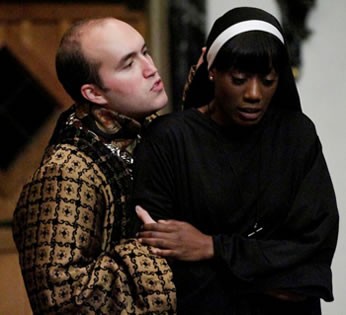Measure for Measure
This Duke's Behavior Comes With the Age
American Shakespeare Center, Blackfriars Playhouse, Staunton, Va.
Saturday, December 4, 2010, C–6&7 (center stalls)
Directed by Jim Warren
The Duke is a recluse lacking self-confidence, happening upon corruption in his government, and courageously rising to the challenge of rooting it out and genuinely falling in love with corruption’s victim. A Duke for the Jimmy Carter age.
The Duke is a career bureaucrat trying to govern down the middle of a society stretched to the extremes of lechery and morality. A Duke for the Reagan age.
The Duke is a despot, setting traps for his deputy, manipulating his subjects, abusing the role of clergy and forcing himself on an innocent woman as shamefully as did the deputy whose downfall he caused. A Duke for the Bush age.
All of these portrayals of one of Shakespeare’s most enigmatic characters seemed “definitive” when I saw them. Then came this definitive but totally different portrayal by Chad Bradford of ASC’s Restless Ecstasy Tour troupe. His Duke was a young man who, as if waking up after his drunken and debauched 30th birthday party—which was not much different from his 29th year, 364th day party, and all the others before that—suddenly realized he had a duchy to govern, he had no idea how to govern it, and, most daunting, the duchy’s culture mirrored his own behavior.
A Duke for the Judd Apatow age.
 Jake Mahler as Angelo tries to seduce Isabella played by Brandi Rhome in Measure for Measure at the Blackfriars Playhouse. Mahler played all the shadings of an arrogant Angelo desperately grappling with his lust, while Rhome's Isabella started off timid and constrained but, as she found her footing, flourished in language and in character, awing Angelo and, later, the Duke. Photo by Tommy Thompson, American Shakespeare Center.
Jake Mahler as Angelo tries to seduce Isabella played by Brandi Rhome in Measure for Measure at the Blackfriars Playhouse. Mahler played all the shadings of an arrogant Angelo desperately grappling with his lust, while Rhome's Isabella started off timid and constrained but, as she found her footing, flourished in language and in character, awing Angelo and, later, the Duke. Photo by Tommy Thompson, American Shakespeare Center.Bradford was endearingly goofy as he unconvincingly tried to play the part of a priest, twirling his crucifix and giving Juliet a resounding smack on the forehead when he blessed her. He held Angelo with a bit of disdain for the deputy’s haughty attitude, but he truly saw him as upright and the guy to give his legal system a much-needed shock. Thus, the Duke was genuinely shocked himself to overhear Angelo’s treatment of Isabella. He came up with his schemes on the fly and showed much frustration at the hiccups. However, through this, he learned how to rule, and by play’s end he was firmly in control of his dukedom, although still bumbling on the matter of courting a woman. When he did formally ask Isabella for her hand in marriage, she didn’t meekly take his hand as the Carter-age novice did, nor did she respond in subdued horror as did the Busch-era Isabella. All any woman in an Apatow film would do is to stare uncertainly at the man, which Brandi Rhome’s Isabella did, as Bradford's Duke responded with an expression of apprehensive pleading. End of play.
Rhome’s own journey to this end also was a true adventure. Her Isabella started off timid, constrained, seeking the monastic life because she didn’t like interacting in society. Quick to run at first when subpoenaing Angelo, she found her footing and suddenly flourished in language and in character, awing Angelo and, later, the Duke.
Jake Mahler played all the shadings of Angelo: arrogant at first, then desperately grappling with his lust, and finally descending to tyranny not when Isabella rejected him but when she threatened him. His facial expressions commandeered his scenes: melting from indifference to affection as Isabella appealed to him, and moving from smugness to irritation as the accusations mounted in the climactic scene, and then to utter despair as the Duke was revealed. Jonathan Holtzman, meanwhile, created his own commanding presence as Escalus, combining a proper gravitas with a touch of humility and humor. His debate with Dennis Henry’s Pompey about the merits of outlawing prostitution was this production’s centerpiece, providing audiences the moral spectrum on which we can relate to, and empathize with, not only Pompey and Mistress Overdone (a lusty Kelley McKinnon) but also Lucio (a bully of a personality as played by Rick Blunt), even Angelo, and, most importantly, Isabella and the Duke.
Eric Minton
December 6, 2010
Comment: e-mail [email protected].
Start a discussion in the Bardroom



 Find additional Shakespeareances
Find additional Shakespeareances